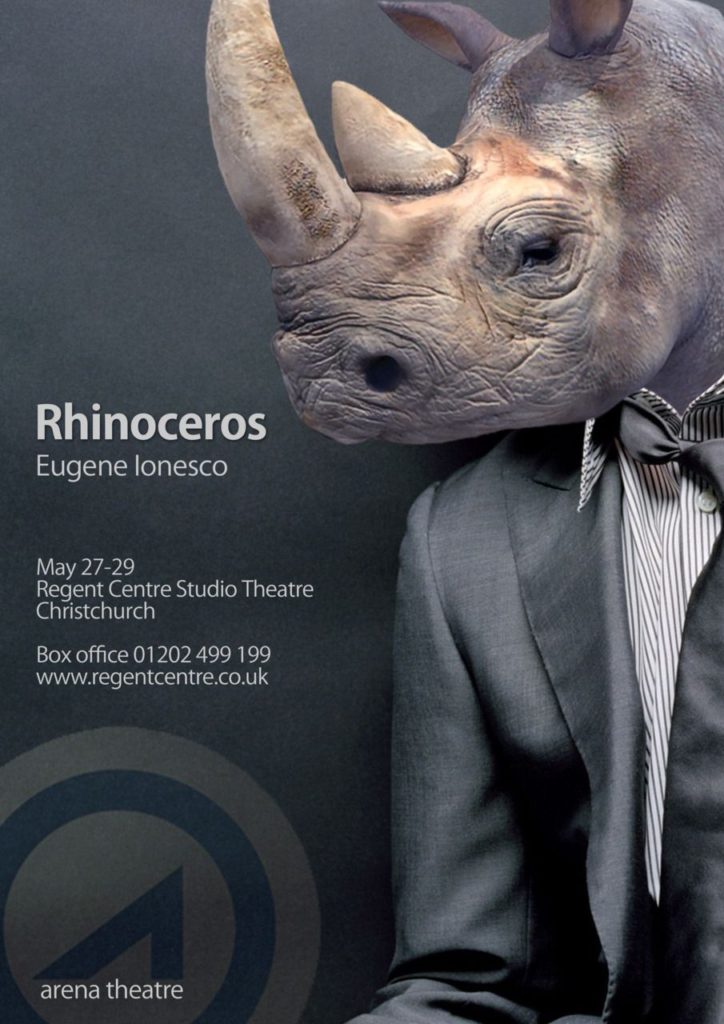
Monday
I’ve come to believe that Ionesco’s Rhinoceros is must reading in the Trump era. Although I found the play heavy-handed and not all that relevant when I read it in the 1970s, I now believe it brilliantly grasps how people find ways to avoid confronting creeping authoritarianism. In other words, it helps us understand how Trump has taken over the Republican Party.
If you don’t know the play, it is set in a village where, one day, people see a rhinoceros charging through the main square. Abnormal though the sight is, people downplay it. To be sure, they are momentarily startled, but they soon return to whatever they were doing. The following dialogue is only a small sample of what goes on for pages:
All: Well, of all things!
Berenger: It certainly looked as if it was a rhinoceros. It made plenty of dust.
Housewife: Well, of all things! Gave me such a scare.
Grocer: Your basket…and all your things…
Old Gentleman: [approaching the lady and bending to pick up her things scattered about the state.]
Proprietor: Really, these days, you never know…
Waitress: Fancy that!…
Housewife: Very kind of you, I’m sure.
Old Gentleman; Oh, please don’t mention it, it’s a pleasure.
Jean: Well, what did you think about it?
Berenger: Well…nothing…it made a lot of dust..
Grocer: [to the Housewife]: I’ve some good leeks as well….
Housewife [to the Old Gentleman] Oh, you are kind! Such a pleasure to come across the old French courtesy. Not like the young people today!
Grocer: You should buy from me. You wouldn’t even have to cross the street, and you wouldn’t run the risk of these accidents.
Jean: But you must admit it’s extraordinary.
Old Gentleman: [taking off his hat and kissing the Housewife’s hand] It was a great pleasure to meet you!
When a second rhinoceros is seen, people are once again surprised and then once again distracted by other matters. Debates break out about whether they were African or Asian rhinos, with categorization seeming to be more important than the animals’ actual presence. It’s like furor over Trump’s tweets while he undermines the Constitution, accelerates climate change, trashes the environment, encourages Russia to attack our democracy and undermine NATO, and turns the government over to crony capitalists.
What once was unthinkable becomes the norm as more and more people turn into rhinos. At first, as with Trump and his supporters, people deny reality, disparaging witnesses and blaming the media:
Papillon: Let us try and get things clear. Did you yourself, with your own eyes, see a rhinoceros strolling through the streets of the town?
Daisy: It didn’t stroll, it ran.
Dudard: No, I didn’t see it personally. But a lot of very reliable people…!
Botard: [interrupting him] It’s obvious they were just making it up. You put too much trust in these journalists; they don’t care what they invent to see their wretched newspapers and please the bosses they serve!
When Daisy’s account is verified by Berenger, they find a way to dismiss him as well. Like Trump supporters with the Mueller Report, they use any uncertainty to dismiss the substance:
Botard: Pff! It’s possible that Mr. Berenger thought he saw a rhinoceros. [He makes a sign behind Berenger’s back to indicate he drinks.] He’s got such a vivid imagination! Anything’s possible with him!
Berenger: I wasn’t alone when I saw the rhinoceros! Or perhaps there were two rhinoceroses.
Botard: He doesn’t even know how many he saw.
Hannah Arendt famously applied the phrase “banality of evil” to Nazis responsible for the Holocaust, and banal is a good descriptor for most of the conversations that occur in The Rhinoceros. A fringe movement on the rise must be countered with vigorous resistance, yet all we see are vapid responses. By the end, only Berenger is holding out, and even he has moments where he desires to become a rhinoceros.
Ionesco witnessed first-hand what he describes. As a Jewish student in interwar Rumania, Ionesco saw his professors and fellow students transform into fascist anti-Semites, which led him to escape to France. Then, following World War II, he called out French intellectuals in love with Stalinism. People find many ways to rationalize their behavior.
It’s not only peer pressure that turns people into rhinos. In an important New York Times column, political scientist Thomas Edsall notes that Trump’s greatest asset may be his political nihilism: he attracts people who say we should burn everything to the ground and start over. In the play, we watch Berenger’s best friend Jean turn into a rhino while spouting such rhetoric:
Jean: We’ve got to build our life on new foundations. We must get back to primeval integrity.
Berenger: I don’t agree with you at all. Just think a moment. You must admit that we have a philosophy that animals don’t share, and an irreplaceable set of values, which it’s taken centuries of human civilization to build up…
Jean: When we’ve demolished all that, we’ll be better off.
Meanwhile, Congressional Republicans either shrug off Trump’s outrages or remain silent. Their hides have gotten tough and their psyches contorted as they run with the herd.
Whether anyone can stop them remains to be seen.
Added note: There is one irony in applying Ionesco’s play to Republicans: RINOs or “Republicans in Name Only” have been drummed out of the party. David Brooks, often called a RINO, once defended the animal as a noble beast. The rhinos in the play are not noble beasts.

